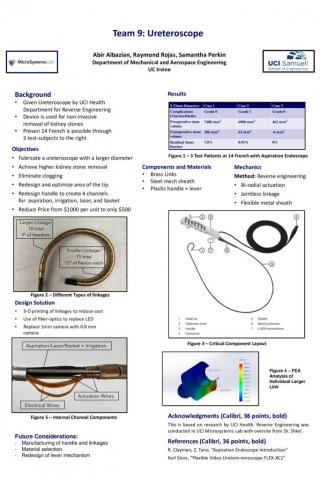Aspiration Ureteroscope: a medical surgical instrument for removal of kidney stones
Background:
The procedure consists of inserting the ureteroscope and actuating the tip to curl into the interior of the kidney and be able to reach every cavity a kidney stone may be located, irrigating inside the body and lasering stones to fragment them into smaller pieces. The device also consists of a LED and camera culminating at the distal tip.
Project Goal:
To expand on current ureteroscope device by implementing a larger aspiration channel while maintaining current device capabilities.
Objectives:
Primary
- Larger aspiration channel diameter.
- 14 Fr device diameter.
- Remove more kidney stones.
- Be compatible with current aspirator and irrigator.
- Disposable
Secondary
- Less clogging of kidney stones in aspiration channel.
- Decrease number of times ureteroscope is inserted during procedure.
- Allow laser more precise access to kidney stones.
- Create 2-4 channels.
- Minimize all other component diameters (LED, camera, laser) in order to increase aspiration channel diameter.
Milestones:
1. Understand the current device: read scientific literature about ureteroscopy, read patents of current devices on the market, research kidney stones, and understand basic kidney/ureter anatomy. (1/31/2024)
2. Understand mechanics of the device: take the device apart in Professor Shkel’s lab under a microscope to reverse-engineer the mechanics of the device. (2/29/2024)
3. Identify what modifications need to be made: find and list what modifications need to be made to the current device to allow for a larger aspiration channel. (3/15/2024)
Purpose:
To improve existing Ureteroscope device by maximizing the aspiration device channel diameter in order to maximize the removal of kidney stones to eliminate the need for repeat procedures.
Team Contact:
Raymond Rojas, rdrojas1@uci.edu
Samantha Parkin, sbaggs@uci.edu
Abir Albazian, aalbazia@uci.edu
Sponsor:
Andrei Shkel, ashkel@uci.edu


